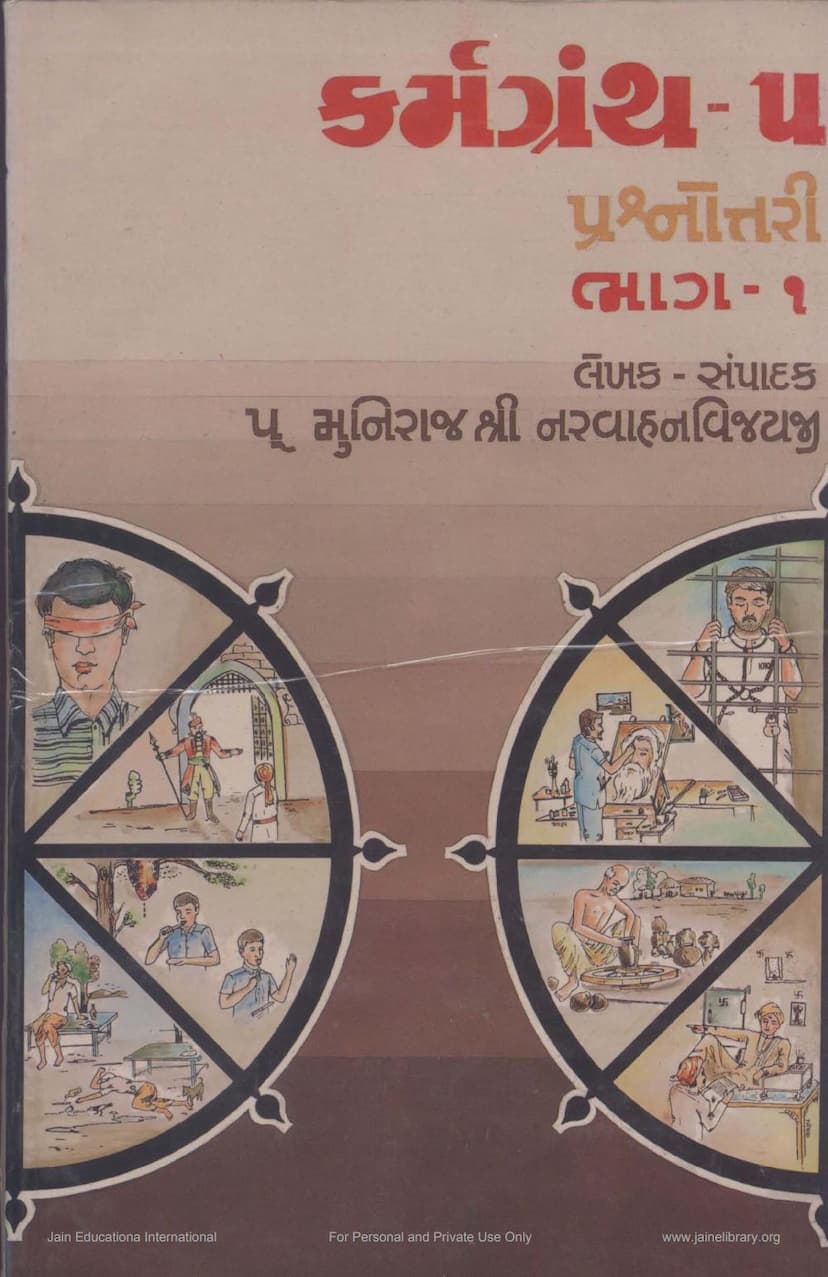Karmgranth 05 By 01 Prashnottari
Added to library: September 2, 2025

Summary
This document is Karmgranth 05 by 01 Prashnottari (Book 05, Part 01 of Karmgranth, in Q&A format), authored and edited by Pujya Muniraj Shri Narvahanvijayji. Published by the Fulabhai Ranchodbhai Parivar, it is a Jain religious text focused on the intricate details of karma, presented in a question-and-answer format.
Here's a breakdown of the content based on the provided pages:
Core Content:
- Focus on Karma: The book is a deep dive into the concepts of karma within Jainism, as indicated by the title "Karmgranth."
- Question-and-Answer Format: The "Prashnottari" aspect highlights that the text is structured as a series of questions and answers, making complex philosophical and spiritual concepts more accessible.
- Detailed Classification of Karmas: The majority of the text consists of questions and answers that meticulously classify and explain various types of karmas based on:
- Nature of Bondage (Bandh):
- Dhruv-bandhi (Permanently Bound): Karmas that are continuously bound in certain stages of spiritual progress.
- Adhruv-bandhi (Not Permanently Bound): Karmas that may or may not be bound depending on specific conditions.
- Nature of Effects (Uday):
- Dhruv-udayi (Permanently Effective): Karmas that are continuously in effect.
- Adhruv-udayi (Not Permanently Effective): Karmas whose effect is conditional.
- Nature of Existence (Satta):
- Dhruv-satta (Permanent Existence): Karmas that always remain in existence.
- Adhruv-satta (Temporary Existence): Karmas whose existence is dependent on certain factors.
- Nature of Effect on Soul's Qualities:
- Ghati (Obscuring): Karmas that obscure the soul's true qualities (like knowledge, perception, bliss, and energy). These are further divided into:
- Sarva-ghati (Completely Obscuring): Karmas that completely obstruct qualities.
- Desh-ghati (Partially Obscuring): Karmas that partially obstruct qualities.
- Aghati (Non-Obscuring): Karmas that do not obscure the soul's inherent qualities.
- Ghati (Obscuring): Karmas that obscure the soul's true qualities (like knowledge, perception, bliss, and energy). These are further divided into:
- Impact on Life (Vipaka):
- Jiva-vipaki (Dependent on the Soul): Karmas whose effects are primarily influenced by the soul's state.
- Bhava-vipaki (Dependent on Life): Karmas whose effects are related to the cycle of birth and death.
- Pudgal-vipaki (Dependent on Matter): Karmas whose effects are related to physical form and matter.
- Kshetra-vipaki (Dependent on Place/Region): Karmas whose effects vary based on the place or region.
- Nature of Bondage (Bandh):
- Guṇasthāna (Stages of Spiritual Progress): The explanations often correlate the binding, effect, and existence of karmas with the fourteen stages of spiritual progress in Jainism, detailing which karmas are active or inactive at each stage.
- Bhāṅgā (Aspects/Modes): The text extensively discusses the different bhāṅgā (aspects or modes) related to the manifestation of karmas (e.g., anādi-ananta, anādi-shānta, sādi-ananta, sādi-shānta), and how these apply to different types of karmas across the stages.
Key Themes and Purpose:
- In-depth Understanding: The book aims to provide a comprehensive and systematic understanding of the vast and complex doctrine of karma, a cornerstone of Jain philosophy.
- Spiritual Guidance: By detailing the workings of karma and its relation to spiritual progress, the text serves as a guide for practitioners to understand the causes of suffering and the path to liberation.
- Knowledge Dissemination: It is part of a larger series of publications, indicating an effort to spread Jain knowledge and teachings.
- Devotional Aspect: The publisher's name and the mention of revered spiritual figures (like Acharya Shri Devendrasuri, Acharya Shri Vijay Ramachandrasurishwarji, etc.) suggest a devotional context and a tribute to their teachings.
Structure and Organization:
- The text is structured as a detailed questionnaire, systematically covering different classifications of karmas and their behavior across the fourteen spiritual stages.
- It frequently breaks down categories of karmas (like mohaniya, nama, etc.) into their sub-types and analyzes their presence or absence at various stages.
- A Shuddhipatra (errata) is included, indicating a focus on accuracy in the presented information.
In essence, "Karmgranth 05 by 01 Prashnottari" is a scholarly and devotional Jain text that serves as a detailed manual for understanding the intricate science of karma, its various classifications, and its manifestation throughout the soul's journey across the fourteen stages of spiritual development.